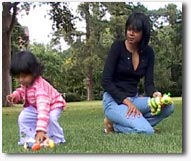
|
|
Training Effective Use of Vision
Awareness and Attention to Detail
Patterns, Letters, Numbers and Words
Activities to Encourage the Use of Vision
Control of Eye Movements - Scanning
Eyes should move smoothly from the first to the second object without going off in other directions. When training scanning, start with side to side movement, then up and down and then diagonal movements. Practice first with the objects close to the person and then increase the distance. Begin with 2 objects and later increase the number.
Choose two familiar objects and place or hold them in front of the person as shown in assessment item on scanning. Give help at first by calling the names or positions of the objects. The eye movements should go straight to each object in turn and fixate without going off in other directions.
The person can practice this by themself by stretching their arms straight in front and holding up the hands. Gaze can be shifted from one hand to the other in turn.
Place two objects in a row in front of the person about half a metre apart. When scanning along a row is accurate, then train scanning up and down and then in diagonal movements.
A game can be played which requires scanning at greater distances. People stand in a row or scattered about. As they call their names the person has to find each one before the next name is called out. This also helps to identify people from their voices and direct vision to the position of a sound.
Place a row of objects on a table or the ground in front of the person while they closes their eyes. Tell them to open their eyes and start at the beginning of the row where your hand is and look to the end. They have to find an object from the row. Objects can then be scattered and the activity can be repeated. Eye movements should be from one object to another without going back to objects. Practice these activities to improve the speed of scanning.
1,393KB
Ask the person to describe the scene and name objects they can see from a window or where you are outside. Other people can describe the same scene when they have finished.
Fixation on an object while the head or body is moving. Tell the person to keep their eyes on your face while turning their head from side to side. Also the head can be rocked from one shoulder to the other while keeping gaze fixed on your face.
Walk around inside or outside together and ask the person to point to objects as you pass them. Touch close objects as you walk past.
Checkpoint: What are the directions you should test for scanning?
|
|
| Visual Communication Unit |


